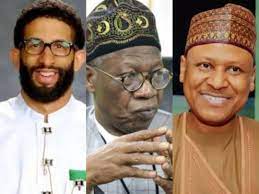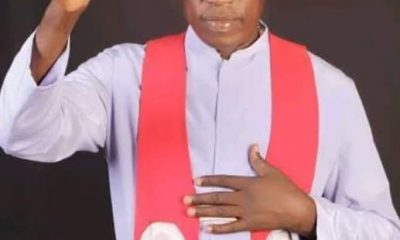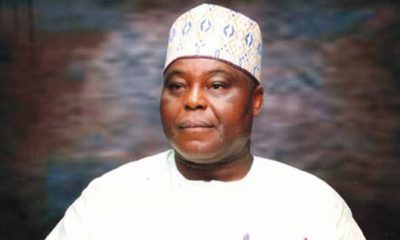News
As Malagi, Ngelale depart from Lai Mohammed’s infamy

By Farooq Kperogi
The Information and National Orientation Minister, Mohammed Idris Malagi, and the Special Adviser to the President on Media and Publicity, Ajuri Ngelale, started their jobs by inaugurating a refreshing and applaudable departure from the primitive information management strategies of their predecessors. But can they sustain the moral high ground they signposted in their initiatory speeches?
On his first day in office on August 1, Ngelale took deserved and carefully targeted potshots at the rude and crude informational tactics of his predecessors. “Gone forever, by the grace of God, are the days when government spokesmen and women would speak down to Nigerians, would use condescending language with Nigerians, and would display some form of institutional arrogance toward Nigerians,” he said. “That will NOT be tolerated under my leadership.”
His message resonated with a broad band of Nigerians, especially on social media, because since the return of civilian rule in 1999, Nigerians have come to associate incivility, crudity, arrogance, and insults with the job of presidential spokesmanship. To have a presidential spokesman disavow this template of relating with Nigerians is pleasantly surprising.
For his part, Malagi, in what seemed like a veiled dig at his immediate predecessor, assured Nigerians that lies and propaganda would no longer be instruments of information management. “This time around, a process of restoring popular confidence and trust in government and its policies shall not lie in the domain of propaganda,” he said. “In other words, the era of relying on propaganda to propagate government programmes is now over.”
This is music to the ears, especially coming after Lai Mohammed whose entire career as Minister of Information and Culture was defined by a bewilderingly extravagant fondness for willful and easily falsifiable lies. Lai’s first name doesn’t just share an uncanny phonemic kinship with “lie”; he actually embodied lies in the most audaciously disreputable way imaginable.
All government information managers lie, but Lai’s lies were unmatched in their coarseness, brazenness, vulgarism, and disdain for the intelligence of Nigerians, which once caused me to wonder if he was the victim of a psychiatric disorder called “pseudologia fantastica” or “mythomania,” that is, chronically compulsive lying that causes liars to believe their own lies. A successor who repudiates this reputation is worthy of our attention.
I have written several past columns on the ineffectiveness of lies, intimidation, insults, and propaganda as means of official communication. In a February 28, 2015, column titled “Why Nigerian Politicians Now Prefer American Public Relations Firms,” for example, I wrote:
“Nigeria’s political public relations is crude, vulgar, and intellectually impoverished. No one who desires to change the hearts and minds of people should rely on it. Nigeria’s brand of political public relations, for the most part, does no more than attract enemies, scare away potential converts, and ossify negative opinions about candidates.
“It consists in barbarous, impulsive, sophomoric insults against real and imagined political opponents—and cloying, hagiographic defense of principals. It lacks nuance, is childish, and seems unconcerned with logic and persuasion.
“The performance of Reuben Abati and Doyin Okupe (who in fact describes himself as an ‘attack lion’)—and several others before them—in the defense of their bosses and the demonization of their bosses’ real and imagined political enemies is a classic example of the kind of primitive political public relations that holds sway in Nigeria. In this kind of political public relations, not only ‘political enemies’ come under heavy fire; facts, truth, and logic also become casualties.”
As spokesmen for Olusegun Obasanjo, Doyin Okupe and Femi Fani-Kayode trafficked in what I called an “unprecedented display of ill breeding and rudeness to our elders” and everyday Nigerians and “reckless and irresponsible juvenile bravado.”
Although Olusegun Adeniyi was urbane, responsible, polite, and guarded in the performance of his job as Umaru Musa Yar’adua’s spokesman, the ease with which he defended the obvious lies and fraud of the administration, especially in the last days of Yar’adua when governance basically ceased, made it difficult to take him seriously.
Then Reuben Abati came and started the trend of inventing group slurs for critics of the government. He infantilized and pathologized critics of Goodluck Jonathan as “collective children of anger.”
Femi Adesina built on Abati’s collective slurring of critics. One of Adesina’s most notable “achievements” was the invention of a vacuous, unimaginative, and idiotic insult for critics of Muhammadu Buhari. He called them “wailing wailers.”
As I pointed out in past columns, “Wailing Wailers” is a historically positive term because it is one of the earliest names of the reggae band formed by Bob Marley, Peter Tosh, and Bunny Wailer in Jamaica. The band took the world by storm with the irresistibly lyrical force and anti-imperialist content of its music. It betrays a spectacular creativity deficit to insult your opponents with a term of esteem.
Outside its creative use as the name of a music band, “wailing wailer” is an unintelligent waste of words. It’s akin to saying “writing writers” or “singing singers.” It takes unbelievably remarkable stupidity to think that “wailing wailer” or “wailer” is an insult, but it bespeaks an even more astonishing height in the ignorance index to hurl it at an opponent and imagine you have done something great.
Most importantly, though, why should a presidential spokesperson who is paid from the public purse vituperate all critics of a government with a crude slur? What does that achieve?
Well, I can tell you what it achieves. It creates a condition psychologists call reactance. Reactance occurs when people are motivated to persist in or double down on an opinion or course of action that caused them to be threatened with insults.
For example, I didn’t set out wanting to be a Buhari critic. In fact, like previous presidents, I wanted him to succeed for the benefit of the entire country. When I started calling out his missteps in 2015 in the most sympathetic ways possible, I got unwarrantedly violent pushback from people who thought Buhari was worthy only of worshipful admiration and not even the mildest censure for even his most obvious infractions.
The Buhari Media Center (BMC) was created to attack, smear, and libel me for merely daring to call out Buhari at a time when most people were scared of pointing out his weak points. But instead of cowing me, BMC’s attacks emboldened me and activated a motivational state of reactance that compelled me to reveal things about Buhari that I probably would have kept under wraps had BMC minions not set out to serially defame me for exercising my right to comment on the government.
Most critical, independent, self-aware people react the same way if their freedom of thought or action is violated with threats, insults, or other tools of emotional blackmail. In other words, it turns even fence-sitters into sworn enemies and hardens the opposition of opponents. The fact that Malagi and Ngelale appear to appreciate this elemental truth in persuasion and information management is admirable.
To my utter embarrassment, I had no knowledge of Ngelale until his appointment by Tinubu. I now know that he is a young man in his 30s (making him probably the youngest presidential spokesperson since 1999) who earned a political science degree from the University of Kansas in the United States in 2011 and had worked as Buhari’s Senior Special Assistant on Public Affairs (where he defended many indefensible things).
Perhaps, his youth, transnational experience, and awful experiences in the Buhari regime have helped to shape his new approach to interfacing with Nigerians.
Malagi’s position doesn’t surprise me. As I wrote in a casual May 18, 2022, article when he ran for APC’s governorship nomination in Niger State, I have known Malagi since the late 1990s when I worked for the Weekly Trust. He is by far the best credentialed minister of information that Nigeria has had in recent memory.
After teaching at a college of education for years, he ventured into public relations, advertising, marketing, and finally publishing. Apart from being the publisher of the Abuja-based Blueprint newspaper, he is also the proprietor of WE 106.5 FM Abuja, was general secretary of the Newspaper Proprietors’ Association of Nigeria (NPAN) and has been a major player in the Nigerian Institute of Public Relations (NIPR).
So, unlike past ministers of information, Malagi has deep intellectual and experiential familiarity with both public relations and journalism. Of course, this is no guarantee that he will succeed—or be better than his predecessors. Power both changes and reveals who people are. I know of no one who has remained the same after stepping foot in the corridors of power. I’ll be pleasantly shocked if Malagi is different.
For all you know, the praiseworthy words of Malagi and Ngelale may be no more than the ephemeral whispers of honeymoon sweet nothings. But the fact that they are unprecedented should invite us to pay attention and monitor how their actions match their words.
*Kperogi is a Professor of Journalism and Emerging Media at Kennesaw State University, Georgia, United States, and a notable columnist
Business
Dangote Refinery to supply 1.5bn litres of petrol monthly

….Writes NMDPRA, Engages Marketers to Stabilise Fuel Market
Photo caption: L R: Chief Executive Officer, Dangote Fertiliser Limited, Vishwajit Sinha; Chief Executive Officer and Managing Director, Dangote Petroleum Refinery, David Bird; President and Chief Executive, Dangote Industries Ltd, Aliko Dangote; Managing Director and Chief Executive Officer, South South Development Commission, Usoro Akpabio, during the visit of SSDC members to the Dangote Petroleum Refinery and Fertiliser Plant in Lagos on Sunday, November 30, 2025.
Dangote Petroleum Refinery has announced plans to supply one billion five hundred million litres of Premium Motor Spirit (PMS) monthly to the Nigerian market in December 2025 and January 2026, a move aimed at ensuring uninterrupted nationwide fuel availability through the festive season and into the New Year.
President and Chief Executive of Dangote Industries Limited, Aliko Dangote, disclosed the plans at the weekend, noting that the refinery will make available 50 million litres of PMS daily beginning December 1.
“In line with our commitment to national wellbeing, and consistent with our track record of ensuring a holiday season free of fuel scarcity, the Dangote Petroleum Refinery will supply 1.5 billion litres of PMS to the Nigerian market this month. This represents 50 million litres per day. We are formally notifying the Nigerian Midstream and Downstream Petroleum Regulatory Authority (NMDPRA) of this commitment. We will supply another 1.5 billion litres in January and increase to 1.7 billion litres in February, which translates to about 60 million litres per day,” Dangote said.
Photo caption: L R: President and Chief Executive, Dangote Industries Ltd, Aliko Dangote; Managing Director and Chief Executive Officer, South South Development Commission, Usoro Akpabio, during the visit of SSDC members to the Dangote Petroleum Refinery and Fertiliser Plant in Lagos on Sunday, November 30, 2025.
Speaking during a visit by the South-South Development Commission (SSDC) to the refinery and the Dangote Fertiliser complex, he stated that the facility currently has adequate stock and is producing between 40 and 45 million litres of PMS daily. He added that the daily supply of 50 million litres should dispel long-standing claims that domestic refineries lack the capacity to meet national demand.
Dangote also revealed ongoing engagement with petroleum marketers to strengthen distribution systems, including expanding the use of CNG-powered haulage.
“Our priority is to ensure Nigeria receives the products it needs. This is not driven by profit motives; it is about guaranteeing the availability of essential energy products. It is similar to the transformation we delivered in the cement sector,” he added.
He further noted that the refinery is progressing with its expansion plan to reach a capacity of 1.4 million barrels per day. More than 100,000 workers are expected to be involved in the expansion of both the refinery and the fertiliser complex. Dangote emphasised that the Group remains committed to its vision, driven by the strong public support for the company’s role in shaping Nigeria’s economic development.
During the visit, the Managing Director of SSDC, Usoro Offiong Akpabio, commended Dangote’s leadership and his continued contribution to strengthening Nigeria’s industrial capability, national energy security and long-term economic competitiveness.
She described the South-South region as Nigeria’s natural energy corridor, with vast crude oil reserves, gas infrastructure, maritime assets, agro-industrial activity and emerging industrial clusters. She noted that deeper collaboration between the region and the Dangote Group could unlock opportunities in product distribution, CNG infrastructure, petrochemicals, agriculture, and employment creation.
Akpabio added that such partnerships would advance the Federal Government’s energy stability agenda and position the South-South as a strategic growth hub for the Dangote Group.
“As the statutory development body for the South-South, SSDC is mandated to drive regional economic development, infrastructure integration, human capital advancement, and private-sector–led growth. In this regard, we stand prepared to support State-level policy and regulatory support for Ease-of-doing-business across our six states. Enabling environments for Dangote Group’s expansion into strategic sectors such as gas processing, agro-industrial value chains, renewable energy, logistics, and export-oriented manufacturing,” she said.
In a letter from the refinery’s Managing Director, David Bird, to the Authority Chief Executive of the NMDPRA, the company reaffirmed its readiness to host NMDPRA officials onsite at the refinery from December 1st to verify and publish its daily supply volumes. The refinery also sought the Authority’s support to ensure unhindered importation of crude, feedstocks and blending components, as well as smooth vessel loading for product evacuation.
“In the spirit of full transparency to the public we are willing to publish our daily production and stock volumes (online and print media),” Bird stated. “We seek the full support of NMDPRA to allow Dangote refinery to import our crude, feedstocks and blending components unhindered as well as support the lifting of our products by vessel. We continue to experience delays in vessel clearance which impacts not only the refinery operations but also our customers, adding unnecessary costs and inefficiencies”.

By Bonaventure Phillips Melah
Photo caption: L R: Chief Executive Officer, Dangote Fertiliser Limited, Vishwajit Sinha; Chief Executive Officer and Managing Director, Dangote Petroleum Refinery, David Bird; President and Chief Executive, Dangote Industries Ltd, Aliko Dangote; Managing Director and Chief Executive Officer, South South Development Commission, Usoro Akpabio, during the visit of SSDC members to the Dangote Petroleum Refinery and Fertiliser Plant in Lagos on Sunday, November 30, 2025.
Dangote Petroleum Refinery has announced plans to supply one billion five hundred million litres of Premium Motor Spirit (PMS) monthly to the Nigerian market in December 2025 and January 2026, a move aimed at ensuring uninterrupted nationwide fuel availability through the festive season and into the New Year.
President and Chief Executive of Dangote Industries Limited, Aliko Dangote, disclosed the plans at the weekend, noting that the refinery will make available 50 million litres of PMS daily beginning December 1.
“In line with our commitment to national wellbeing, and consistent with our track record of ensuring a holiday season free of fuel scarcity, the Dangote Petroleum Refinery will supply 1.5 billion litres of PMS to the Nigerian market this month. This represents 50 million litres per day. We are formally notifying the Nigerian Midstream and Downstream Petroleum Regulatory Authority (NMDPRA) of this commitment. We will supply another 1.5 billion litres in January and increase to 1.7 billion litres in February, which translates to about 60 million litres per day,” Dangote said.

Photo caption: LR: President and Chief Executive, Dangote Industries Ltd, Aliko Dangote; Managing Director and Chief Executive Officer, South South Development Commission, Usoro Akpabio, during the visit of SSDC members to the Dangote Petroleum Refinery and Fertiliser Plant in Lagos on Sunday, November 30, 2025.
Speaking during a visit by the South-South Development Commission (SSDC) to the refinery and the Dangote Fertiliser complex, he stated that the facility currently has adequate stock and is producing between 40 and 45 million litres of PMS daily. He added that the daily supply of 50 million litres should dispel long-standing claims that domestic refineries lack the capacity to meet national demand.
Dangote also revealed ongoing engagement with petroleum marketers to strengthen distribution systems, including expanding the use of CNG-powered haulage.
“Our priority is to ensure Nigeria receives the products it needs. This is not driven by profit motives; it is about guaranteeing the availability of essential energy products. It is similar to the transformation we delivered in the cement sector,” he added.
He further noted that the refinery is progressing with its expansion plan to reach a capacity of 1.4 million barrels per day. More than 100,000 workers are expected to be involved in the expansion of both the refinery and the fertiliser complex. Dangote emphasised that the Group remains committed to its vision, driven by the strong public support for the company’s role in shaping Nigeria’s economic development.
During the visit, the Managing Director of SSDC, Usoro Offiong Akpabio, commended Dangote’s leadership and his continued contribution to strengthening Nigeria’s industrial capability, national energy security and long-term economic competitiveness.
She described the South-South region as Nigeria’s natural energy corridor, with vast crude oil reserves, gas infrastructure, maritime assets, agro-industrial activity and emerging industrial clusters. She noted that deeper collaboration between the region and the Dangote Group could unlock opportunities in product distribution, CNG infrastructure, petrochemicals, agriculture, and employment creation.
Akpabio added that such partnerships would advance the Federal Government’s energy stability agenda and position the South-South as a strategic growth hub for the Dangote Group.
“As the statutory development body for the South-South, SSDC is mandated to drive regional economic development, infrastructure integration, human capital advancement, and private-sector–led growth. In this regard, we stand prepared to support State-level policy and regulatory support for Ease-of-doing-business across our six states. Enabling environments for Dangote Group’s expansion into strategic sectors such as gas processing, agro-industrial value chains, renewable energy, logistics, and export-oriented manufacturing,” she said.
In a letter from the refinery’s Managing Director, David Bird, to the Authority Chief Executive of the NMDPRA, the company reaffirmed its readiness to host NMDPRA officials onsite at the refinery from December 1st to verify and publish its daily supply volumes. The refinery also sought the Authority’s support to ensure unhindered importation of crude, feedstocks and blending components, as well as smooth vessel loading for product evacuation.
“In the spirit of full transparency to the public we are willing to publish our daily production and stock volumes (online and print media),” Bird stated. “We seek the full support of NMDPRA to allow Dangote refinery to import our crude, feedstocks and blending components unhindered as well as support the lifting of our products by vessel. We continue to experience delays in vessel clearance which impacts not only the refinery operations but also our customers, adding unnecessary costs and inefficiencies”.
News
Gunmen abduct five in Enugu community

Some women in Ezimo community, Udenu Local Government Area of Enugu State, on Saturday, staged a protest over the alleged kidnap of five residents and the shooting of another during an attack on the community.
The protesters, who marched through major parts of the community, said the incident had heightened fear and insecurity in the area.
One victim of the attack is currently receiving treatment in the hospital.
A social media influencer, ‘Sen.’ Chijinkem Ugwuanyi, made this known via Facebook on Saturday.
Ugwuanyi revealed that resident who confirmed the incident said recent cases of abductions and shootings had left the community unsafe, prompting the women to demand urgent government intervention.
In a video shared on Ugwuanyi’s Facebook page, the protesters called on the Enugu State Government and security agencies to step in and restore peace, warning that residents could no longer live under constant fear of attacks.
-

 News2 years ago
News2 years agoBreaking: Tinubu’s authentic ministerial nominees
-

 News9 months ago
News9 months agoSenate to speed up conclusion of Nigeria Forest Security Service Bill
-

 News2 years ago
News2 years ago“Anytime we want to kill terrorists, President would ask us to take permission from France but they were killing our soldiers-” Niger Republic coup leader
-

 News2 years ago
News2 years ago“I’m leaving the Catholic church because Bishop Onah is oppressing me,” says Okunerere
-

 News2 years ago
News2 years agoRadio Nigeria’s veteran broadcaster Kelvin Ugwu dies three months after retirement from service
-

 News2 years ago
News2 years agoDokpesi and the Gazebo Mystique
-

 News2 years ago
News2 years agoTsunami: Tinubu orders dissolution of managements, boards of MDAs, to sack all Buhari’s political appointees
-

 News2 years ago
News2 years agoPersons against Allagoa’s reforms behind protests at NSITF
